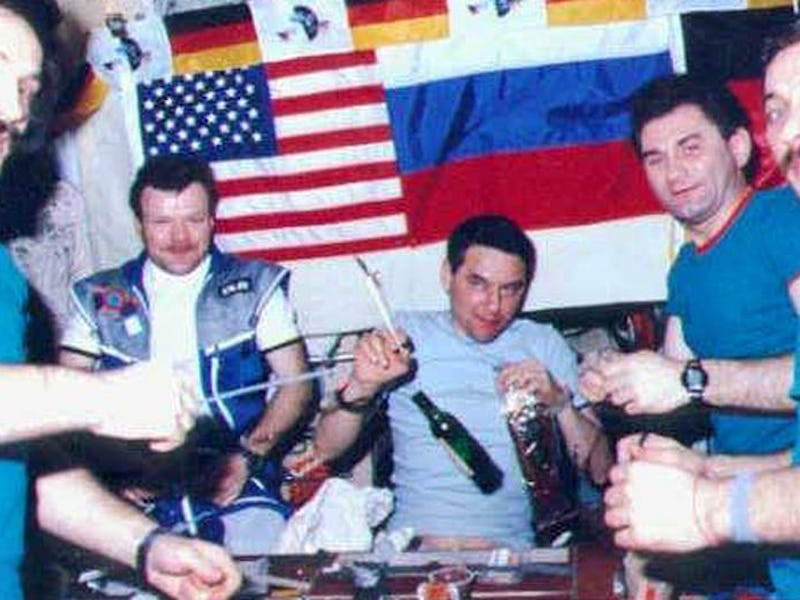Alcohol in Space: A Brief History of Giving Zero Fucks in Zero Gravity
The Russians started it.

Space is sterile, but it isn’t dry. There’s alcohol in space. Clouds of it, actually. And we even know of a comet that’s zipping around space, vomiting up ethanol wherever it goes. Humans have also done their in part adding liquor to the great beyond. Astronauts drink, and they always have.
The history of drinking in space begins, appropriately enough, on a Russian launch pad. Russia seems to have never had any rules on booze in space. Back when the Mir space station was a thing, doctors recommended that Russian cosmonauts onboard drink cognac in order to keep their immune systems up and running. It’s kind of like when people tell you a little whiskey will do you good even though they have no basis for believing that. In any case, Russia’s looser standards on booze in space seem to have survived up to the present day.
Things are a bit less loose for Americans. NASA has strict policies in place when it comes to booze. Those rules basically boil down to this: “NOPE.” But it hasn’t always been so.
Perhaps the best/most historic instance of an astronaut drinking in space was Buzz Aldrin taking communion on the moon after he and Neil Armstrong set foot on the grey rock in 1969. According to The Guardian, Aldrin poured the wine into a chalice his church had given him. In microgravity, the wine curled up slowly to one side of the cup. Fast forward to the next decade when we were building and launching Skylab, the United States’ first space station (operational from 1973 to 1979). NASA needed to come up with a new menu for its astronauts when it quickly became clear they were very unwilling to subsist off the same foods packed for each Apollo mission.
When NASA was coming up with the final Skylab menu, booze came up. Specifically, the space agency was looking to allow sherry aboard for consumption. Because sherry is already heated during processing, engineers figured it would transition to zero gravity without spoiling or having its taste diminished. When the public caught wind that NASA would be sending alcohol into space, they were less than pleased. As Edward Gibson, an astronaut on the third Skylab mission, told the Milwaukee Journal in 1972: “The problem is that you have got some extremists around and we (astronauts) kind of represent a form of purity. As soon as you taint that purity with alcohol, they really get upset.”
After a minor uproar, NASA basically banned all booze from being consumed in space by its astronauts — including aboard the International Space Station. It probably wouldn’t have mattered much, since the smell of the sherry triggered a gag reflex in some instances — and vomiting is kind of a big no-no in a confined, gravity-free environment. It’s not totally clear if other countries’ astronauts on the ISS are also required to follow this rule, but we can say for sure no American is getting buzzed like Buzz.
American astronauts do, however, handle alcohol if it’s part of a research experiment. For example, a University of Colorado-led project tested small batches of beer brewed in space versus the surface, and found that space yeast produced more alcohol than Earth yeast. A Japanese distillery sent whiskey up to the ISS to see how zero-gravity would affect it.
So right now, astronauts aren’t drinking in space. That doesn’t mean it’s going to stay that way. Alcohol in space feels about as inevitable as sex in space — it’s just going to happen. So what will our future space explorers be imbibing?
Probably not beer. There are challenges to brewing beer, but even worse is trying to consume it. In a zero gravity setting, the bubbles don’t rise, so the froth doesn’t peak into a head and then settle down. Furthermore, since there’s no gravity to pull liquids to the bottom of the stomach and allow the case to rise out, astronauts would experience pretty disgusting wet burps (as they would with any carbonated drink in space).
These obstacles aren’t stopping others from trying to troubleshoot beer in space. One startup called Vostok is trying to develop the world’s first space beer in order to tap into the space tourism market early. It’s currently working out a formula of a low-carbolated beer that will reduce the chances of contending with wet burps.
Yes, beer in space sounds great, but in all likelihood, private companies that want to offer space tourists a little something for the ride will likely just stick to wine and liquor and avoid the bubbly mess.
You can be sure, however, once we perfect agriculture on our future lunar and Martian colonies, the next step will be getting the fermentation of all alcohol to an acceptable standard. It’s only human.